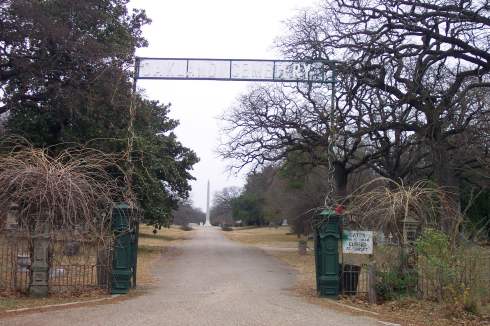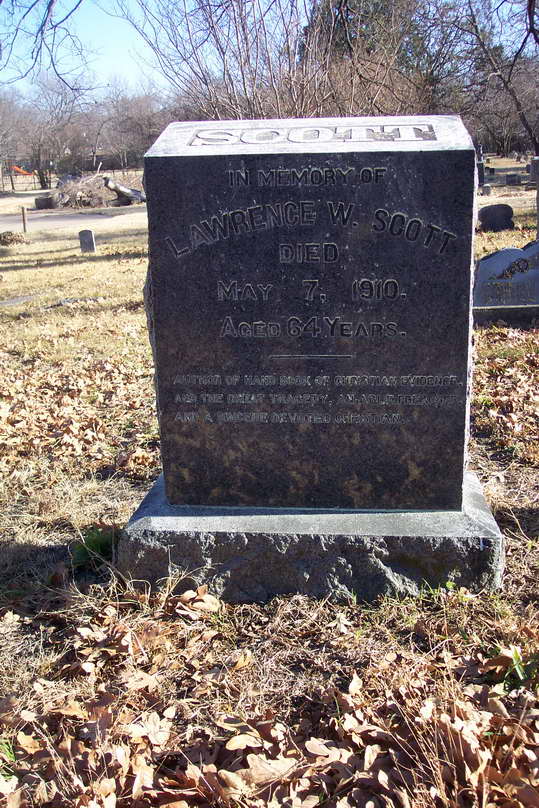1846-1910
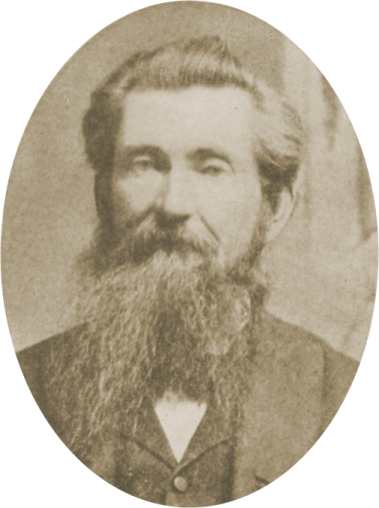
A Brief Sketch, Boles
Lawrence W. Scott, Bishop
In Memory Of Lawrence W. Scott, Elliott
Directions To Grave & Pictures
![]()
A Brief Sketch On The Life Of Lawrence W. Scott
The subject of this sketch was a very peculiar man and many extraordinary events are connected with his life. It sometimes happens that there are types of men who draw to themselves but few friends, and yet they have a powerful influence over human society. Lawrence W. Scott was a man of this type.
Lawrence W. Scott was born on May 29, 1846, at Morgantown, W. Va. Little is known of his parents or his early life in West Virginia. In 1863, at the age of seventeen, he left his native State and went West, and he finally located in Texas. He drifted around for a year or two in that State, with nothing much before him as a definite aim in life. He had a frail body, and he thought that the West would help him to build a strong physical body. At this time he thought nothing of his soul or Christianity; he was interested only in the material side of life. He finally was employed as a bartender in one of the saloons in Mount Pleasant, Texas. While in this employment he heard a sermon preached by old Brother Thomas Barrett. This put him to reading the Bible. He had never read the Bible and had not cared to read it before this time. He became profoundly interested in it.
After he had read the Bible through, he then re-read the New Testament. He finished reading it through one night about ten o'clock. The next morning he arose earlier than usual and went to his place of business earlier than was his custom. When the owner of the saloon for whom he was working came in, Mr. Scott told him that he would not work for him any longer. His employer called for his reason, thinking that he had offended young Scott in some way. Mr. Scott replied : "You could not understand my reason, hence I will not take your time or my time to give it. I quit here and now." With these remarks, he walked out of the saloon and walked fifteen miles to Mount Vernon, Texas, where Brother Barrett lived, and stopped at the home of R. W. Holbrook's father. He announced that he wanted to be baptized. He was sick with chills and fever, and Brother Holbrook advised him to wait a few days until he was well. After a few days the delicate youth said to Brother Holbrook: "I walked fifteen miles to be baptized, and I want to be baptized." His kind host called for Brother Barrett and the elders of the church, and they went to the pasture and cut the six-inch ice to get into the water to baptize him. We may know that a young man who was delicate in health and sick must have had a very strong determination and deep conviction to obey the command of God under such adverse circumstances. This was one of the marks which distinguished Lawrence W. Scott from the common lot of men.
He soon found employment in a printing office and worked there for some time. He continued the study of the Bible and religious subjects. He had no relatives in that country and no relatives who were interested in him. While working at the printer's trade he suddenly decided that he would go to school and improve his mind and preach the gospel. He did not reveal to any one the secrets of his heart or the determination of his soul. He simply announced to his employers that he was going to quit. As in the case of the saloon keeper, his employer asked for the reason for his quitting. He replied: "I have good and sufficient reasons, but you would not be, interested in them and I will not trouble you with them." He left Texas and went to Lexington, Ky., and entered Kentucky University. He remained here in school for a few years. No student was more diligent than Lawrence W. Scott. His ability was soon recognized and his peculiarities were overlooked by those who recognized in him extraordinary ability. Through his undaunted courage and his keen logical mind he soon took rank among the most scholarly men of his day. He never married and had no home. He did not want to be cumbered with family cares or home duties. He had dedicated his life to preaching of the gospel, and he was determined that no earthly ties or fleshly relations should interfere with his intellectual and spiritual activities. He never owned a home and never claimed any particular place as his home; he was a pilgrim upon this earth with no certain abiding place.
Brother Scott was an able preacher of the gospel. His peculiarities were not observed while he was in the pulpit. He spoke with ease and grace before the public. His sermons were always logical and his method of presenting them was always followed with strict regularity. He preached much in West Virginia, Pennsylvania, Michigan, Missouri, Texas, Arkansas, and Louisiana. He was not a successful evangelist in the popular sense of that term. His preaching strengthened the churches and taught them. He did not have enough of the enthusiasm to make him a successful evangelist. His life was well ordered and his work as a preacher built up the church rather than bringing new converts into the church.
Brother Scott gave much time and thought to the evidences of Christianity. In fact, he had a specific and definite work, and that was the defense of the Bible. He had a number of debates with atheists and infidels. He met in debate the noted infidel, Doctor Stine, of Kansas, and Mr. Peterson, of Texas. He met these men frequently in debate, and the denominations bore testimony that he completely vanquished these opposers of the Bible. After his debates he prepared a series of lectures, and he traveled extensively and delivered these lectures on the evidences of Christianity. He traveled over a wide territory and visited many churches in many States. He received invitations from the leading denominations to come and deliver his lectures to their membership. Some of his friends thought that he did more good defending the teachings of the Bible with atheists and infidels than he had done in pulpit preaching.
Brother Scott was the author of a number of books. He wrote and published the following books: "Handbook of Christian Evidence;" "The Texas Pulpit;" "The Devil, His Origin and Overthrow;" "The Great Crisis." At the time of his death he was gathering and preparing material for a book on certain phases of baptism. He was a clear and ready writer. In his Preface to his "Handbook of Christian Evidence" he says : "If any skeptic honestly disbelieves the Bible and the religion therein revealed, it must be for the want of evidence-no one has a right to disbelieve from any other consideration; therefore, I propound to all such three questions: (1) What evidence would it require to convince you? (2) What evidence has been adduced? (3) In case the religion of Jesus were true, what evidence could be adduced in its favor that has not been adduced? Before any book should be received as a satisfactory refutation of Christianity it should, first, define clearly the proof necessary to establish the claims of such an institution; second, set forth fully, clearly, and concisely all the proof that has ever been adduced in its favor; third, show conclusively that the proof adduced is either insufficient or irrelevant."
The above is given to show that he was a clear thinker and analyzed his subject with more than ordinary accuracy.
Brother Scott was never strong physically. In 1910 he became sick, and he went to the home of Brother J. D. Elliott and grew worse. A week before his death he went to Tioga, Texas, but was finally brought back to the home of Brother Elliott on May 5. He died on May 6, 1910, at the age of sixty-four. He was buried at Oakland Cemetery, Dallas, Texas. He lived a lonely life, with few mortal companions, but he ever lived with the Lord.
His modesty and humility are seen in the last paragraph of his book, "The Texas Pulpit of the Church of Christ." After giving short sketches of all the preachers mentioned in the book, he has the following to say of himself: "Lawrence W. Scott would only say, of himself, that he is a Virginia-born, Kentucky-educated, Missouri-developed Texan, and was 'water-bound a while in Arkansas;' and, of the preachers, that there are, in the living pulpit of the Lone Star State, many other `able ministers of the New Testament,' some of whom he hopes to present in a future volume, and all of whom he hopes to meet in `the world to come."'
-From Biographical Sketches Of Gospel Preachers, H. Leo Boles, Gospel Advocate Company, Nashville, Tennessee, 1932, pages 359-363, First Appearing in the Gospel Advocate, August 28, 1930, pages 830, 831.
![]()
Lawrence W. Scott was known to the whole brotherhood of the churches of Christ through his books and writings, and to a large section of them by his travels among them. He was born at Morgantown, W.Va., in 1846. He came to Texas about 1863. He was employed as a bartender in Mount Pleasant there, and heard Brother Thomas Barrett preach. This set him to studying the Bible. He gave up his position in the saloon and walked fifteen miles to Mount Vernon, where Brother Barrett lived, and stopped at the home of Brother R.W. Holbrook's father. He want to be baptized, but, being sick with chills an fever, Brother Holbrook advised him to wait a few days and he would try to cure him. His agues "shook the house," and the weather was intensely cold. After a few days the delicate youth said to Brother Holbrook, "I walked fifteen miles to be baptized, and I want to be baptized." So Brother Holbrook called the preacher and an elder of the church, and they went to the water and cut the six-inch ice and baptized him. He secured employment in a printing office and worked at that trade for some time, went to Kentucky and worked his way through college (Kentucky University), and began to preach.
Brother Scott was always frail, yet he lived to be sixty-four years old, and did a great deal of work. He has to his credit several good books, all having had a good sale. His "Handbook of Christian Evidence" is out of print, and he was arranging to have it reissued. He edited a book of sermons, "The Texas Pulpit," which is well known. His study of demonology, "The Devil-His Origin and Overthrow," is probably the only work of the kind by any of our brethren. His latest work was a study of the trials and crucifixion of Christ, "The Great Crisis." He also relieved what the tedium of hard study by jotting down what he was too modest to call poems, and the result was a book of rhymes.
Brother Scott had done much in the defense of the Scriptures, having not only written a book on "Christian Evidences," but delivered lectures on "The Bible Against Infidelity" and held several debates with noted infidels. He me Dr. Stine, of Kansas, and Mr. Peterson, of Texas, and was credited by Baptist and other papers with completely vanquishing these opposers of the Book of God. He delivered his lectures over a very wide territory and in churches of nearly all the leading denominations, being an eloquent speaker in his younger days and a defender of the great truths held by all Protestants.
Brother Scott spent most of his life in Texas. His labors were always fruitful. Notices of his early work show that he held meetings with fifty or sixty additions, and the last month of his life he held a short meeting and won several into the service of Christ.
Only a few weeks ago he delivered a series of lectures on the "Jews" at Austin and at the Sabinal Bible School. He had an active and clear mind up until the end of his long, useful life, and a day or two before his death, when I commented on his continuing to produce books, he replied, "Yes, and I have several others in me clamoring to come out." He was gathering material for a book on certain phases of baptism, and expected to get it together at Paris, Texas, in June.
He spent about three years lately visiting among his old friends and relatives in Virginia, Pennsylvania, and New York, and had been back in Texas only a few months when he died. He came, as had been his habit, for over a quarter of a century, to the home of Brother J.D. Elliott, and here he gradually grew weaker, though not confined to bed. A week before his death he went to Tioga, where he was quite ill till brought back to our home on a stretcher. He came on May 5, and we summoned a fine doctor, and were advised to send him at once to a hospital. I waited on him all that night. He was persuaded to go Friday morning; he had a talk with Brother R.W. Holbrook that afternoon, and spoke of himself a a "ripe sheaf for the garner," but delayed making his will, as he did not realize how near the end was. He died peacefully at a little past midnight, May 6. His heart was very weak, and the frail body, after sixty-four years struggle to maintain life, succumbed.
The funeral was held at Pearl and Bryan Streets Church, with a large gathering of Christians who desired to do honor to this old soldier who fell in the battle, though few present knew him personally. Brother L.S. White led in the funeral service, assisted by Gen. R.M. Gano, Joe S. Warlick, R.W. Holbrook, William J. Bishop, and J.B. Nelson. The service was simple and impressive, without much sadness, and there was not one relative of the deceased present, as all of them live too far away.
Four of Brother Scott's oldest friends were present at the funeral -General R.M. Gano, R.W. Holbrook, and Mrs. J.D. Elliott, of Dallas; and J.L. Rutherford, of Mount Vernon.
The burial was at Oakland Cemetery, Dallas. Brother Scott had in his pockets enough to pay all burial expenses, and we gave him a nice burial with a neat casket in a good part of Oakland Cemetery, and we hope to place a substantial stone to permanently mark the last resting place of a true soldier of the cross.
I wish to write up a brief biography of Brother Scott, and I wish all of his old friends who may see this, and his numerous relatives, would sen me some item about him, which I might use in compiling his life story. My address is P.O. Box 307, Dallas, Texas.
-William J. Bishop, Gospel Advocate, May 19, 1910, page. 612
![]()
In Memory Of Lawrence W. Scott
A unique character, a brilliant and scholarly man, one who gave his life's work for the cause of his Master, was sick in our home, and died here in Dallas, Texas, without a relative near, only brethren and friends to administer to him and see that he was properly cared for and that he had a Christian burial. His body rests in Oak Lawn Cemetery in an unmarked grave. Many admired him, many loved him. I loved him for his work's sake. Shall we allow his grave to remain unmarked? No. I have in my hands a small sum left after paying all funeral expenses, to be expended in the erection of a suitable monument ot mark the grave of this good man. Not enough, however; so I am writing to ask those who knew and admired him to contribute to a fund for the purpose of erecting a suitable monument to mark that grave, not an expensive monument, but one to cost about two hundred dollars, which I think is a very modest sum. I do not believe in extravagance in this line; but our old heroes who have fought so long and been so faithful should be remembered. I am going to ask that all who desire a share in this work send direct to me their contributions. I will appreciate it if his old comrades and admirers will send a suitable inscription to be placed thereon. I will leave it to our local elders to select from all sent the most suitable one. I refer those who do not know me to Brother Joe S. Warlick and Brother L.S. White, Dallas, Texas. Receipt of all funds will be properly acknowledged.
- by J. D. Elliott, Gospel Advocate, September 12, 1912
![]()
Directions To The Grave Of Lawrence W. Scott
The Oakland Cemetery in Dallas, Texas is the final resting place of Lawrence W. Scott. The cemetery is located in the southern part of Dallas, Texas at 3900 Malcolm X Blvd. On I-45 south of Dallas take Exit 283, Martin Luther King Jr. and go east. Go about six or seven blocks and turn right on Malcolm X. Just after the 11th street on your left you will see the entrance to the Oakland Cemetery. The office sits in the front, and the entrance is from either side of the house (office). The actual cemetery gate will be behind the office. Head straight into the cemetery on Main St. and to the large obelisk straight ahead. The drive goes around the obelisk. Proceed past the obelisk to the end of the road and turn right. Go about 7 or 8 rows and stop. It will be the third stone in from the little road. While in the cemetery be sure to visit the grave of General R. M. Gano.
GPS
Coordinates
32°45'48.1"N 96°45'21.5"W
or D.d. 32.763367, -96.755967
Grave Facing NW
Section 8, NW 1/4 of Lot 19 (Zimmerman Plot)
Oakland Cemetery: (214) 421-2244
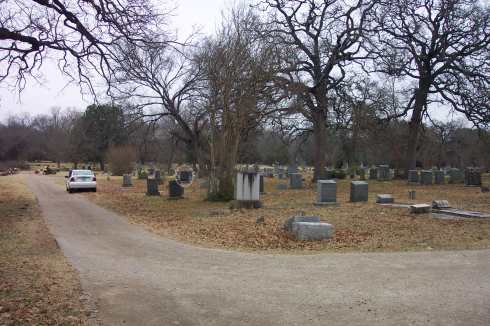
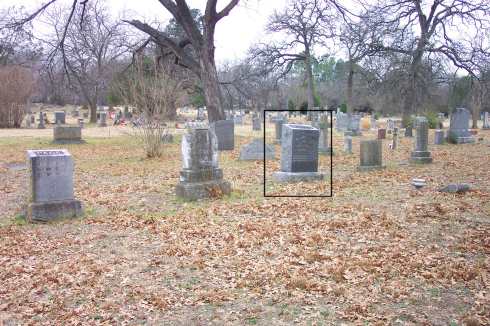
SCOTT
In Memory Of
Lawrence W. Scott
Died
May 7, 1910
Aged 64 Years
Author Of Hand Book Of Christian Evidence,
And The Great Tragedy, An Able Preacher
And A Sincere Devoted Christian
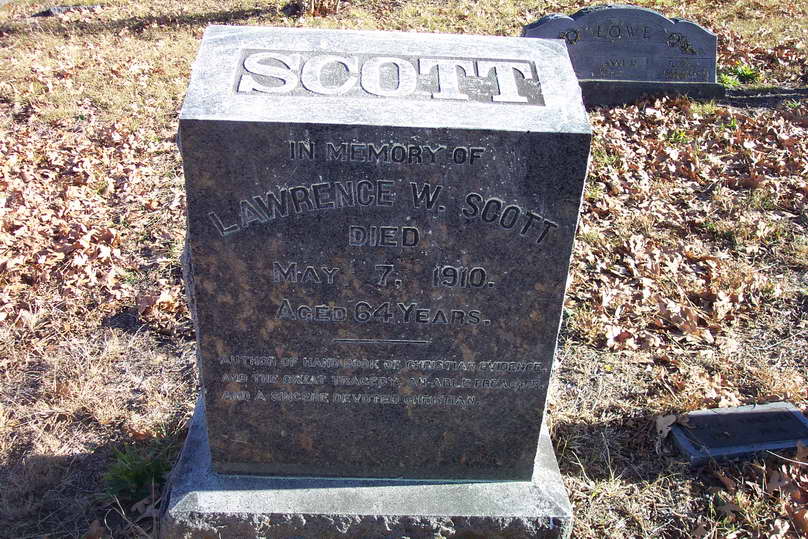
![]()
